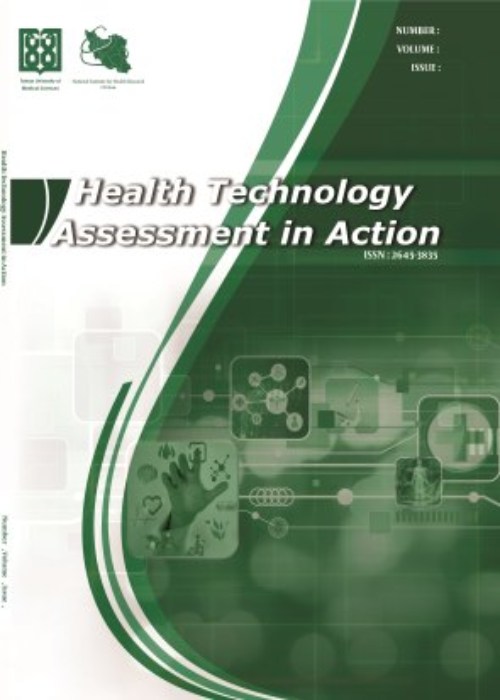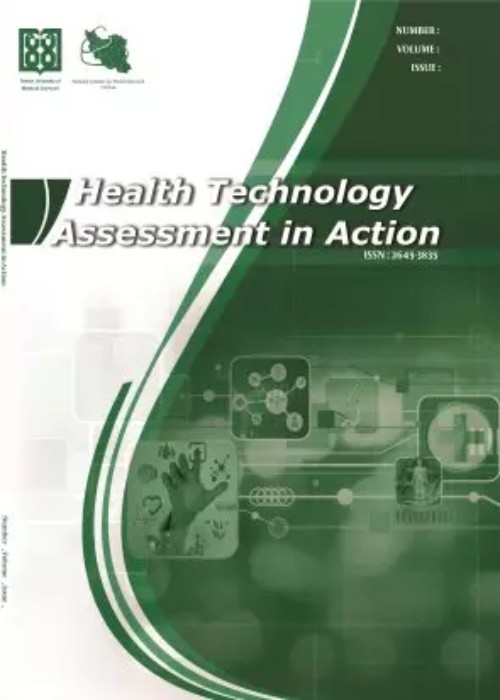فهرست مطالب

Health Technology Assessment in Action
Volume:6 Issue: 4, Aug 2022
- تاریخ انتشار: 1401/10/10
- تعداد عناوین: 5
-
-
Page 1Background
Human exposure to fungal elements is inevitable. Normal inhalation routinely deposits fungal spores within the nose and paranasal sinuses. Incidence of fungal infections are increasing, because of the greater use of immunosuppressive, increasing incidence of transplantation, chemotherapy, HIV infection, and diabetes mellitus. The aim of this research was to study the effects of nasal irrigation with normal saline on eliminating nasal fungal flora.
MethodsWe studied the clinical efficacy of nasal saline irrigation on the healthy individuals in a pilot study. Nasal swabs were used to get the nasal samples from 140 cases, 90 women and 50 men, currently living in Tehran. Those cases with positive fungal cultures, underwent nasal saline irrigation. They were reevaluated with nasal sampling and culture after a week.
ResultsPositive fungal culture was detected in 22 cases (15.7%): saprophyte fungi were the most common (45.4%). After nasal saline irrigation, negative fungal cultures were found in 54.5% of cases (P value=0.0009).
ConclusionsThis study demonstrated that nasal irrigation with nasal saline appears to be both safe and effective on the eradication of nasal fungal flora. So, it seems to be useful in prevention and management of all types of fungal rhinosinusitis.
Keywords: Nasal Cavity, Paranasal Sinuses, Saline Solution, Nasal Irrigation, Fungal Infections -
Page 2Background
The World Health Organization (WHO) has referred to infertility as a worldwide reproductive health problem that threatens the mental health of infertile couples and can lead to disorders such as stress, depression, isolation, and guilt.
ObjectivesThis study aimed to determine infertile couples’ knowledge, attitudes, and behavior regarding assisted reproductive technology in 2020.
MethodsThis cross-sectional descriptive study was performed on 331 infertile persons referred to Al-Zahra Infertility Center in Shahrekord, Iran, in 2020. Sampling was done by convenience sampling method. Data were collected by a self-administered questionnaire consisting of four parts. The first consisted of 17 demographic questions, the second consisted of 20 questions, the third consisted of 23 questions, and the fourth consisted of 9 questions. The data were analyzed by SPSS software. A P-value of less than 0.05 was considered significant.
ResultsIn this study, 331 infertile persons referred to the infertility clinic of AL-Zahra were studied. The mean awareness of infertile couples was 14.26 (moderate knowledge level), and their mean attitude was 57.01 (negative attitude). Comparison of study participants’ knowledge with gender, address, ethnicity, language, education, the duration of infertility, causes of infertility, female factor, age, and years since marriage was significant (P < 0.05). Comparison of attitudes of study participants with gender, address, education, job, and the duration of infertility and causes of Infertility was significant (P < 0.05). The relationship between the knowledge of study participants and the duration of infertility, cause of infertility, knowledge of (IUI, IVF, ICSI, ZIFT, replaced uterus, donated ovum, sperm donation, and the donating embryo) and attitude towards (IUI IVF replaced uterus donated ovum) was significant (P < 0.05). The relationship between the attitude of study participants and the duration of infertility, knowledge of (IUI, replaced uterus and donated ovum), and attitude of (IUI IVF replaced uterus donated ovum) was significant (P < 0.05).
ConclusionsThe results of this study indicated that the higher the level of awareness was, the more negative the attitude toward assisted reproductive technology became. In addition, in people who used more pharmacological methods to treat infertility, the rate of using the new assisted reproductive method was less than the pharmacological methods. Therefore, it is recommended that health system policymakers and guardians improve childbearing status in the country by establishing counseling classes and heightening people’s awareness of new methods of assisted reproduction to address misconceptions about these methods.
Keywords: Knowledge, Attitude, Practice, Assisted Reproductive Technique, Infertility -
Page 3Background
Marketing is a vital but less addressed capability in knowledge-based companies and is a leading contributor to challenges in this sector.
ObjectivesThis study aimed to identify the marketing challenges of health-related knowledge-based products.
MethodsThis research is a qualitative study. The participants included 10 experts from technology units located in the growth centers of Tehran University of Medical Sciences, who were selected by purposive sampling and using the theoretical saturation index. Data were collected using semi-structured interviews and analyzed using MAXQDA version 10 and qualitative content analysis with an inductive approach.
ResultsData analysis led to the extraction of 4 main categories, including legal/regulatory, financial, infrastructural, and market factors. Each of these main categories consisted of several subcategories that described a specific aspect of the challenges of this field.
ConclusionsLegal/regulatory, financial, infrastructural, and market factors are among the marketing challenges experienced by technology units located in the growth centers.
Keywords: Marketing Challenges, Knowledge-based Companies, Knowledge-Based Products, Health Field -
Page 4
Context:
Infodemic in the COVID-19 pandemic is referred to as too much information about this disease that spreads quickly. This information can cause various psychological consequences for people. This systematic review studied the effect of the infodemic on individuals’ mental health in the COVID-19 pandemic.
MethodsThe principles of PRISMA were used to conduct this systematic review. Data were selected using a search strategy in the WOS, PubMed, and Scopus databases on December 31, 2021. The inclusion criteria comprised English-language original articles relevant to the study’s purpose. We excluded all short articles, letters to the editor, conference abstracts, review articles, and any articles unavailable in their full texts.
ResultsFinally, 17 articles were selected. The results showed that the population of these articles was from China, Singapore, Palestine, Romania, Indonesia, Paraguay, Hong Kong, and Iran. These articles also included health professionals and medical staff (two studies), adults (three studies), citizens and the general public aged 16 or over (eight studies), students (one study), teachers (one study), and the elderly (two studies). The sample sizes varied from 126 to 5,203. Also, these articles examined mental health concerning anxiety (13 studies), depression (eight studies), stress (four studies), sleep disorders (two studies), emotions (two studies), panic, social isolation, and mental health in general.
ConclusionsPeople more subjected to COVID-19-related information are more prone to psychological consequences and more exposed to anxiety, depression, and stress.
Keywords: COVID-19, Infodemic, Information, Media, Mental Health -
Page 5
Big data refers to large and complex data sets that cannot be easily processed, managed, or analyzed using traditional data processing tools and techniques. The role of big data in health encompasses a wide range of applications that leverage large and complex data sets to improve health outcomes and healthcare delivery. The goal of universal health coverage (UHC) is to ensure that everyone has access to the health services they need when and where they need them, without financial barriers or catastrophic health expenditures that can lead to poverty. Big data in Iran’s health system has the potential to significantly improve healthcare delivery, enhance patient outcomes, and reduce healthcare costs. Moreover, big data can assist in ongoing monitoring and evaluating the progress toward achieving UHC goals in Iran.
Keywords: Big Data, Equity, Universal Health Coverage, Iran, Health Policy


